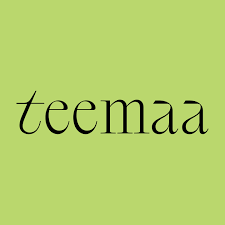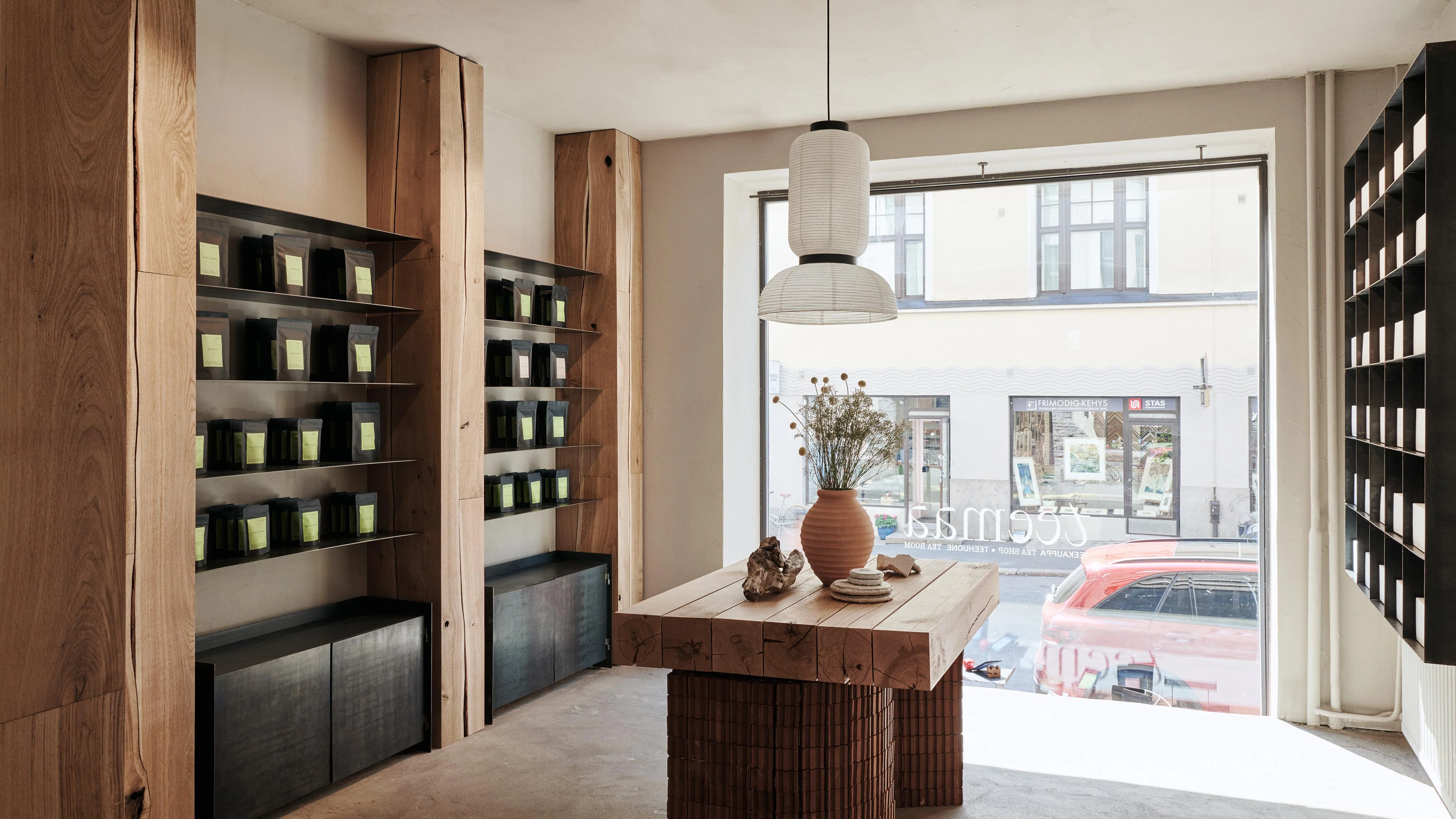Tea in a Coffee Nation: Peng Luo's Journey with TeeMaa
- Lorela Lohan

- Aug 7, 2024
- 8 min read
Interview with Peng Luo, Founder of TeeMaa, a tea room in Helsinki, Finland
Setting up the scene
On July 9, 2024, after an early morning flight from Brussels, I arrived in Helsinki, Finland, feeling the familiar fatigue that accompanies travel. Seeking a place to unwind and recharge, I made my way to TeeMaa Teahouse, a renowned sanctuary for tea lovers in the heart of the city. As I stepped inside, the calming ambience immediately enveloped me, offering a much-needed respite from the hustle of travel. The room was filled with customers indulging in teas, Japanese pastry delicacies and matcha-based alternatives.
Photo Credit: Aleksi Tiikala
TeeMaa’s design is a masterful blend of traditional tea culture and contemporary Nordic minimalism. The space, redesigned by Yatofu Creatives in 2021, spans 80 square meters and is characterized by its use of materials that evoke the raw, natural essence of tea-making. Weathered steel, textured bricks, and warm wooden surfaces come together to create a serene environment that feels both grounded and sophisticated. The design reflects the philosophy of TeeMaa—where the ancient art of tea meets modern craftsmanship.
Photo credit: Lorela Lohan
As I settled into a cosy corner of the teahouse, I ordered a 2024 Gold Tea, a fresh and vibrant green tea from Hunan, and Taiping Houkui from the 2024 Spring harvest. The latest was brewed in two ways: gong fu cha style in hot 80-degree water and infused in cold water for 30 minutes. The vegetal flavours of the tea were perfectly complemented by a slice of Japanese fluffy cheesecake. The artisanal pastries are crafted by a local bakery that specialises in Japanese delicacies.
Photo Credit: Lorela Lohan
Type: Green tea
Origin: Anhui, China
Taiping Houkui, one of the legendary teas of Anhui Province, consists of huge but separately flattened leaves. The basic character is delicate but not thin, and there is a delicious butter-like taste with a hint of sweet taste.
Chinese name: 太平猴魁, tàipíng hóukuí [houkuei];Taiping is the name of a historic prefecture, and houkui (liter. Monkey king) is associated with the first part of the name of tea-making villages (Hou-) and the name of the tea inventor (Wang Kuicheng; 王魁成).
With the tranquil environment setting the tone, I was eager to delve into conversation with Peng Luo, the founder of TeeMaa, who joined me for an insightful discussion about her journey and the evolution of her tea business.
Lorela: Peng, thank you for hosting me in this beautiful space. TeeMaa is truly a haven for tea enthusiasts. I’m curious—how did you come to establish your tea room here in Helsinki?
Peng: Thank you, Lorela. It’s wonderful to have you here. TeeMaa began as a very small venture back in 2012. I had just graduated from Changsha Tea Art School, where I developed a deep appreciation for the intricacies of tea culture. With a passion for sharing this knowledge, I decided to open a tea room here in Helsinki, a city where coffee is the dominant drink of choice. Initially, it was just me running the show, and our space was very modest—we could only host four guests at a time, and our menu featured just seven teas, all sourced from my home region of Hunan. It was a humble beginning, but I was driven by a desire to introduce authentic, high-quality teas to a new audience.
My partner, Xinyuan, joined me shortly after I opened the tea room. She shared my passion for tea and had also pursued her tea education in China. Together, we’ve navigated the challenges of building TeeMaa into a space that not only serves tea but also educates and inspires our customers.
Lorela: Starting a tea room in a country like Finland, where coffee culture is so deeply ingrained, must have presented unique challenges. How did you manage to carve out a niche for tea here?
Peng: It was an uphill battle at first. Finland has one of the highest per capita coffee consumption rates in the world, so introducing tea as a viable alternative was not easy. In the beginning, most of our visitors were either tea connoisseurs or people with a strong interest in tea culture. They appreciated the quality and authenticity of our offerings, but our customer base was quite small.
To grow, we listened closely to what our customers wanted. They began asking for a wider variety of teas, and so we expanded our menu to include selections from other regions, while still maintaining our focus on quality and ethical sourcing. We’ve always prioritized working with small producers, usually ordering just 10-20 kilograms of each tea per season. This allows us to maintain close relationships with the farmers, which is incredibly important to us. Before placing any orders, we take the time to understand their farming techniques, the mastery they bring to tea preparation, and their commitment to sustainable practices. This trust is the foundation of our business.
Lorela: It’s clear that you’ve built TeeMaa with a strong emphasis on relationships and quality. How have you been able to expand your business over the years?
Peng: Our growth has been very organic. We started by hosting small tea tastings and themed events, which helped us connect with our community and introduce more people to the world of speciality tea. Education has been a key part of our strategy. We realised early on that many people were unfamiliar with the differences between artisanal and industrially produced teas, so we began organising workshops highlighting these distinctions. We wanted to show our customers the incredible craftsmanship that goes into producing high-quality, hand-made tea.
Over time, we’ve also collaborated with local artists and craftsmen to create unique experiences that blend tea culture with other forms of art. For example, we’ve hosted the work of local artists allowing guests to enjoy art while tea tasting. These collaborations have allowed us to offer something different, something that appeals to a broader audience.
Lorela: It sounds like TeeMaa is as much about community and culture as it is about tea. I’m curious—how do you ensure that every cup of tea is brewed to perfection, especially given the importance of water quality in tea preparation?
Peng: Water quality is crucial in tea preparation. We’re fortunate that Finland has some of the best tap water in the world, but we still take extra precautions to ensure it’s perfect for brewing tea. We’ve tried brewing tea using various mineral bottled waters for comparison, but the results didn’t present any substantial differences. This attention to detail is part of what makes our teas so special—we want every cup to bring out the best in the leaves.
Lorela: Participating in festivals and larger events must be another avenue you explore to promote TeeMaa. How do these fit into your overall business strategy?
Peng: Festivals and large events can be a double-edged sword. On one hand, they offer a great platform to reach new customers and showcase our teas. However, we’ve found that the costs—travel, booth setup, and time commitment—often outweigh the benefits. Instead, we’ve chosen to focus on more intimate events where we can create a deeper connection with our audience. These smaller gatherings allow us to engage with people on a more personal level, which is more in line with our brand values.
Lorela: I can see why that approach works so well for you. Lastly, Peng, I have to ask—what is your current favourite tea, and how do you see the future of your tea business evolving?
Peng: My favourite tea tends to change with the seasons and my mood, but right now, I’m particularly enjoying Phoenix Dancong Oolong, especially the highly roasted varieties. It has a depth and complexity that I find satisfying.
As for the future, I see TeeMaa continuing to grow as both a business and a community hub. While we’ve already achieved a lot, there’s still so much more we want to do. We’re planning to expand our tea education programs to make tea culture more accessible to newcomers. We also want to continue exploring collaborations with local artists, though we’ve found that tea ceramics, for example, sell more slowly—it’s a niche market, but one we’re passionate about supporting.
Photo credit: Lorela Lohan
Overall, I’m excited about what the future holds. TeeMaa started as a passion project, and it’s become a fulfilling career. I’m grateful for the journey so far, and I look forward to continuing to share the world of tea with more people.
Lorela: Peng, it’s been an absolute pleasure hearing about your journey and the vision behind TeeMaa. Your dedication to quality, community, and cultural exchange is truly inspiring. I’m excited to see where TeeMaa goes next and how you continue to shape the tea culture here in Finland.
Peng: Thank you, Lorela. It’s been wonderful sharing our story with you.
Conclusion
As our conversation drew to a close, Peng graciously offered me a final treat—an exceptional smoky yellow tea known as "Grandpa Special." This unique tea, hailing from the mountainous forests of Hunan, China, left a lasting impression with its strong smoky fragrance, mild sweet taste, and lingering sweet aftertaste. Handpicked from the first flush in spring, the tea leaves are carefully processed using traditional methods passed down through generations. The tea is smoked by burning maple seeds, giving the liquor its distinctive yellow hue and rich, smoky character.
GrandPapa Special is more than just a tea; it carries a story that reflects the deep connection between tea, tradition, and family. The name "GrandPapa" originates from the fact that the very first batch of this smoked yellow tea was made by Peng's grandfather. This rare and precious tea, a local speciality from the village where Peng grew up, is almost impossible to find outside of this region.
In Peng’s village, each spring, the villagers gather to pick the freshest tea leaves from the forest and roast them into this delicious tea, originally made just for their own families. However, as younger generations move away from these labour-intensive traditions, the production of this unique tea has dwindled. Remarkably, though, the tea has found unexpected popularity in Finland, possibly due to its mysterious connection with the smoky aroma reminiscent of Finnish saunas.
Recognizing this growing interest, Peng’s mother has begun recruiting the village’s elder generation—grannies and grandpas, 11 in total—to make this tea for TeeMaa’s customers. The elders are thrilled that their tea is appreciated in faraway lands, giving them a renewed sense of purpose and pride. This year, they even convinced a young woman, Peng’s cousin born in 1983, to join the tea-making team, ensuring that this beautiful tradition continues.
For all tea lovers, whether you’re a connoisseur or just beginning your tea journey, I highly recommend a visit to TeeMaa in Helsinki. It’s more than just a place to enjoy a cup of tea—it’s an experience that invites you to savour the depth and beauty of tea culture in a setting that feels both welcoming and serene. Don’t miss the chance to try it out when passing by.
Category: Yellow tea
Origin: Hunan, China
Growing environment: Unattended forest in mountainous Hunan.
Aroma and flavour: Strong smoky fragrance, mild sweet taste and sweet aftertaste.
Description: Tea leaves were handpicked from the first flush in spring. The tea was made with local traditional methods that have been passed from generation to generation. It's smoked by burning maple seeds. The liquor is yellow.




































Comments